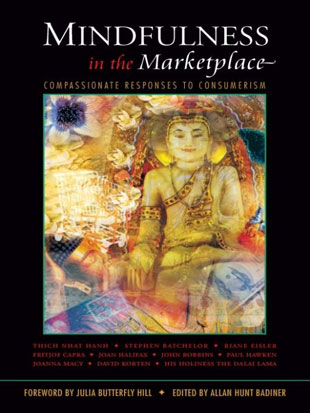Buddhists point to the threefold poisons of greed, hatred, and ignorance as the source of much suffering in the world. Consumerism feeds all three big time. So does our habit of putting self above others. The Buddha said, "Like a bee collecting nectar, one acquires wealth by harming no one." Good advice but very hard to follow in a world where we often do not know the people in faraway places who suffer as a result of our over-consumption and selfishness.
Allan Hunt Badiner, the editor of this superb anthology, notes in the introduction: "Buddhism is all about changing consciousness in order to affect changes in behavior. May we be wise enough to use the tools of transformation that the Buddha offered to help us on the path toward salvation and an end to the needless suffering resulting from corporate greed, government indifference, and our own ignorance and delusion."
The book is divided into five sections: The All-Consuming Problem, Self as Consumer, In the Market for Dharma, Market as Nature, and The Path of Mindful Consumption. Stephen Batchelor explains the practice of generosity. Thich Nhat Hanh discusses the three kinds of nutriment the Buddha spoke about. His Holiness the Dalai Lama reflects on ethical economics. Lewis Richmond offers a meditation on money. John Robbins muses on the question—is there slavery in your chocolate? Duane Elgin covers voluntary simplicity. Kate Lawrence writes about how mindful food choices reduce suffering.
One of the most thought-provoking sections is a question-and –answer essay with Joan Halifax. On the criteria for compassionate consumption, she observes: "We should ask, 'By consuming this, am I enlightening myself?' Be aware that whatever we consume entails loss and suffering. The Japanese call this: mono non aware, 'the slender sadness,' which means that by living we cause suffering and death to other beings. Look deeply at your vegetarian food. Many beings died for us to enjoy a carrot."
We can all make a difference in the world by the choices we make as consumers. This anthology suggests many fine spiritual practices to use during these transactions.
